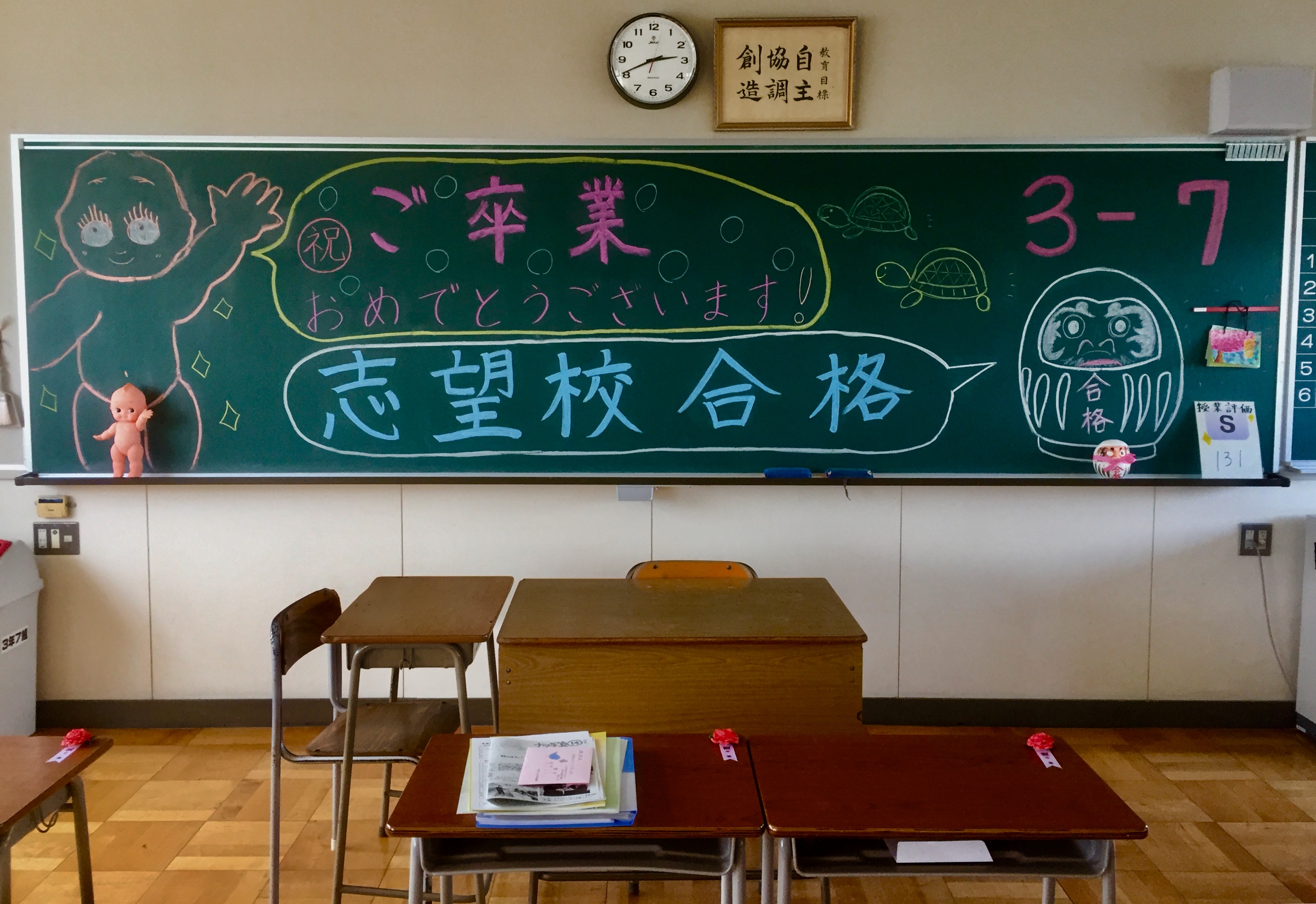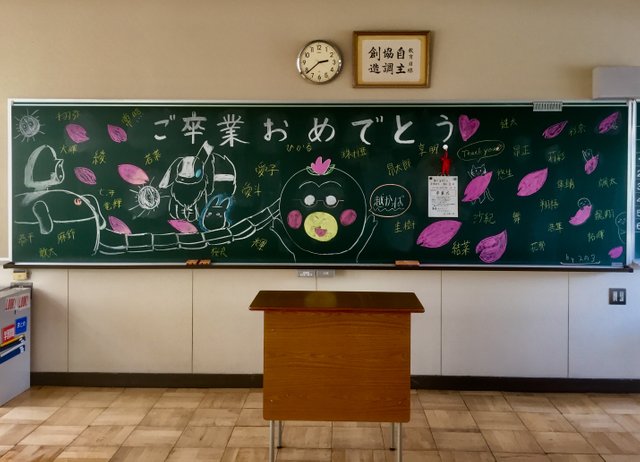This Is Japan
Explore everyday life in Japan

Now it is March, and in Japan that means that large numbers of students across the country are graduating.
Soon they will be saying goodbye to their elementary schools, their junior high schools, their high schools, their colleges, and their universities. Soon they will be saying goodbye to the teachers who have helped them and made an impact on them over the past three years or more. Soon they will be saying goodbye to the students in the lower grades with whom they have shared many school experiences. Soon they will be saying goodbye to the surroundings and environments they have become so accustomed to, and the activities which they have done there. Soon, junior high school and high school students will even be saying goodbye to many of their good friends and classmates as they prepare to split up and go to different high schools and universities across the country where they will continue further down their individual paths toward the various futures that await them.
In many Japanese schools, these goodbyes aren’t taken lightly. They are surrounded by form and ceremony, both of which help to not only create unity among students but also help to bring a meaningful and formal close to what are considered significant and formative years in Japan.

The Okurukai
The okurukai is a sending off ceremony that many elementary and junior high schools (but not all) have for students who will be moving on to the next level of their education. When done well, it is one of the most moving ceremonies I have ever seen.
Students from each grade level work together with teachers to create skits, dances, and performances that celebrate and honor the senior students of their school while recreating some of the memories they have all shared over the past one to four years. Slide shows with pictures of the graduating students from their first to almost last days of school are made and set to music. Gifts, often in the form of letters and poster cards are made and exchanged. And the senior students are paraded into and out of the gym, either individually or in pairs, to music and grand applause.
What I find to be one of the most touching and incredible parts of the ceremony is that it is almost entirely created by, orchestrated, and implemented by students. At the elementary school level, students run the P.A. and sound system. They click through the slideshows. They make speeches and announcements. At the junior high school level, the brass band members flawlessly perform songs of their choosing. Members of the student council introduce videos and slide shows that have been arranged and edited by the students themselves. Entire grades of students perform songs that they have practiced and choreographed largely on their own.
The okurukai really illustrates the value that is placed on concepts like unity and respect in Japan, respect not just for the present, but for the memories of the past as well. It reveals what I think is the true purpose of the Japanese educational system, and that is to raise socially bonded and united citizens. Whereas western educational systems tend value the individual over the group and tend to champion creative thinking and intellectual problem solving, the Japanese educational system, in my opinion, places more value on the importance of social interactions and harmony.
Each system has good points and bad points, and this post isn’t trying to weigh one educational system against another. It is merely a light introduction to something called an okurukai, which is a ceremony that I think all students in any school around the world could benefit from.
Note: Unfortunately, I don’t have any photographs of an actual okurukai, so I’ve included some examples of the chalkboard art that is commonly found in Japanese schools just before graduations.
This is an ongoing series that will explore various aspects of daily life in Japan. My hope is that this series will not only reveal to its followers, image by image, what Japan looks like, but that it will also inform its followers about unique Japanese items and various cultural and societal practices. If you are interested in getting regular updates about life in Japan, please consider following me at @boxcarblue. If you have any questions about life in Japan, please don’t hesitate to ask. I will do my best to answer all of your questions.
Man wish i lived in japan.... but im not good at learning Japanese! I remember before going to Japan I always heard about how ridiculously expensive everything was... And then getting there and being like "This isn't bad at all... o_O" Of course I was with a host family so i wasn't the one paying for food and the like, but still mentally comparing to what I see my parents paying in Canada, it's actually much cheaper.
Yeah, I don’t think it’s very expensive either. Rent can cost a lot in the major cities, but outside of there, it’s very reasonable. Much more so than the US, I think. If you stay for longer, the Japanese will come. You just need a girlfriend who doesn’t speak English and your level will skyrocket;)
That would be a hilarious combo! Lol
I couldn’t speak Japanese when I got here eight years ago. My wife couldn’t speak English. Somehow we figured it out. And now I speak the language. Learn by necessity.
That's usually how it works. hehehehe
Japan is great for visit and too good for education
It is great to visit! That’s for sure.
all people hear about high quality education in japan, but they said it's very very expensive! is that true??
To be honest, I don’t fully understand the costs. My children are in nursery school, and I think that is very reasonable. Elementary and junior high school don’t cost much more than various fees and material costs, as far as I know (but I hear that those can add up). High schools are divided into public and private schools, and it’s my understanding that private schools can be quite expensive, though I don’t have any figures for you. And universities, from what I hear, are expensive as well. Again, how expensive they are compared to other countries, I don’t know.
thank you for the informations, i'm a teacher in Intermediate Education and in my country education is all free, but not good quality and there is not much of private schools.
i hope you will post more about education in japan :) ,thankx
Quality is a loaded word when it comes to education. For you, what represents a quality education? Or, in what ways are the schools in your country lacking?
First, we lack modern teaching methods and lack educational subjects; sometimes you do not find things to do simple chemical or physical experiments. Second, our ministy of education did not study a special curriculum for the students of this country. Rather, the curriculum of France was introduced and applied here. This is not useful at all.
Moreover, the problem of overcrowding of students in class and Length of the curriculum, and the abundance of lessons.....and and and the problems of education here does'nt end at all lol, just last week teachers and students was protesting demanding the resignation of the minister.
Well, the schools I work in have quite a few supplies and resources, but much less than the schools I grew up with and worked at in America. Japan also uses an adopted educational system, but they have altered it so that it fits they’re cultural values. The teaching methods here are beginning to change, which I think is an improvement. For a long time they have been based primarily on lecture and memorization.
Thank you sharing your experiences. I was born there but left when I was really young and want to plan to move back one day. I remember a lot of Japan but it was old Japan so I feel I have to re-learn everything again so working on that. Upvoted, followed, and resteemed.
Thanks. I haven’t been writing about Japan very much lately, but I’ve amassed quite a few posts on what I consider Everyday Life here over the past year and a half. You can follow the links back if you’re interested.
The nice thing about Japan is that while it changes, it seems to carry a lot of the Old Japan with it.
Authenticity BOT!
Great job! We found more similar posts, but your post is the 1st one posted.
このように日本の文化を発信してくださる @boxcarblueさん。ご自身が所有する写真があれば、もっと書きたいことがあったかも?と思いました。
学生時代にいつも怒ってばかりのイメージの先生が送る会のときは、泣いてばかりだったことを思い出しました(笑)
本当はビデオを撮って投稿したかったのですが、それはできないでしょうね。この写真だけでダメかもしれません。
送り会はとっても素晴らしい式だと思います。毎年送る会を観ながら感動して波がでます。きっと生徒に印象が残るだと思います。